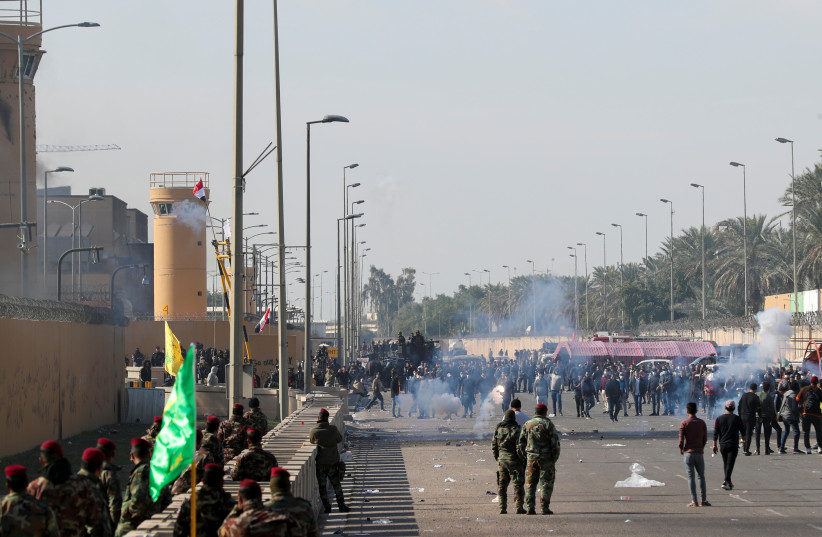Approximately seven mortar rounds landed in the US Embassy compound in Baghdad during an attack early on Friday, a US military official told Reuters, in what appeared to be the largest attack of its kind in recent memory.
US forces in Iraq and Syria were also targeted with rockets and drones at least five more times on Friday; three times at separate bases in Syria, and twice at the Ain al-Asad airbase west of Baghdad, a US defense official said.
The attacks were the most recorded against US forces in the region in a single day since mid-October, when Iran-aligned militias started targeting US assets in Iraq and Syria over Washington's backing of Israel in its war against Hamas in Gaza.
The embassy attack marked the first time it had been fired on in more than a year, apparently widening the range of targets. Dozens of military bases housing US forces have been attacked, increasing fears of a broadening regional conflict.
No group claimed responsibility, but previous attacks against US forces have been carried out by Iran-aligned militias operating under the banner of the Islamic Resistance in Iraq.

The US military official, speaking on the condition of anonymity, left open the possibility that more projectiles were fired at the embassy compound but did not land within it.
The US officials said Friday's attacks caused no injuries, while the embassy attack caused very minor damage.
Explosions were heard near the embassy, in the center of Baghdad, at about 4 a.m. (0100 GMT) on Friday. Sirens calling on people to take cover were activated.
State media said the attack damaged the headquarters of an Iraqi security agency.
Sheik Ali Damoush, a senior official in the Lebanese group Hezbollah, said in a Friday sermon that attacks by Iran-aligned groups across the Middle East aim to apply pressure for a halt to Israel's offensive in the Gaza Strip. He did not refer specifically to Friday's attack.
US forces in Iraq and Syria have been attacked at least 84 times since Oct. 17, the defense official said.
The US has responded with a series of strikes that have killed at least 15 terrorists in Iraq and up to seven in Syria.
'Acts of terrorism'
The attacks pose a challenge for Iraqi Prime Minister Mohammed Shia al-Sudani, who has pledged to protect foreign missions and capitalize on fragile stability to focus on the economy and court foreign investment, including from the United States.
Sudani directed security agencies to pursue the perpetrators, describing them as "unruly, lawless groups that do not in any way represent the will of the Iraqi people," a statement from his office said.
He also said that undermining Iraq's stability, and reputation and targeting places Iraq has committed to protect were acts of terrorism.
The head of militia Kataib Sayyid al-Shuhada, one of the main factions that has been targeting US forces in the region, said in a social media post that he rejected "stopping or easing operations" while "Zionist crimes continue in Gaza."
A US embassy spokesperson called on the Iraqi government to do all in its power to protect diplomatic and coalition personnel and bases.
"We reiterate that we reserve the right to self-defense and to protect our personnel anywhere in the world," he said.
Aside from its diplomatic staff in Iraq, the United States has about 2,500 troops in the country on a mission it says aims to advise and assist local forces trying to prevent a resurgence of Islamic State, which in 2014 seized large swathes of both countries before being defeated.
Iran-aligned Houthis have been firing at Israel and ships in the Red Sea in a campaign they say aims to support the Palestinians. US warships have shot down several of their projectiles.
